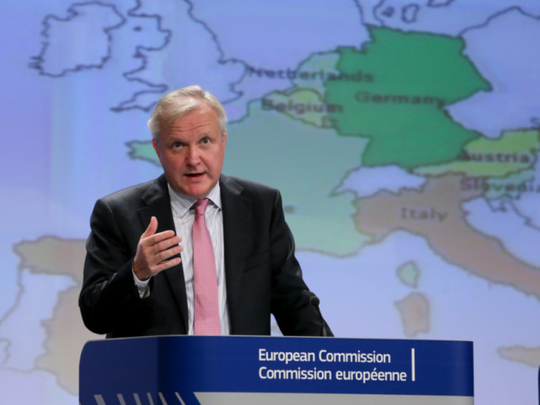
Brussels: The European Union issued stern warnings to France, Spain and Italy on Friday that they must hold unwaveringly to their budgets for 2014, saying they were at risk of missing targets.
The European Commission, wielding new Eurozone watchdog powers for the first time, cleared France’s draft 2014 budget, but warned that there was “no margin” left for slippage in reducing the deficit.
The commission also warned that it saw considerable dangers that figures supplied by the governments in Madrid and Rome might not be achieved.
However, the Commission, interfering for the first time in this way on national budgets using new post-crisis powers, approved the draft budgets of all 13 Eurozone countries which are not in bailout programmes.
The warnings to France, Spain and Italy, come against a background of fragile and stuttering Eurozone recovery from recession and a debt crisis, and of big social strains in countries already applying tough measures to correct public finances.
Tensions are now rising strongly in France, and the latest Commission warning follows a number of recent critical reports on the outlook for French reforms.
The Commission said that the measures contained in the French government’s 2014 budget suggest “adequate progress” towards an extended 2015 deadline for meeting the EU’s deficit ceiling, “albeit with no margin”.
France has the Eurozone’s second-biggest economy, but French output fell back and shrank in the third quarter according to the latest growth figures. The government in Paris had made only “limited progress” in 2013 in tackling its budget problems, the Commission said.
Seal of approval
French Finance Minister Pierre Moscovici, in Brussels for two days of talks among Eurozone and EU counterparts, said the verdict amounted to a seal of approval for French policy on public finances.
“It’s a sort of certification,” Moscovici said after Swedish Finance Minister Anders Borg had spoken of “really worrying” developments in France.
France has obtained a two-year extension to a previous deadline for achieving deficit targets, and was supposed to post deficit figures of 3.9 per cent of gross domestic product for 2013, 3.6 per cent for 2014 and 2.8 per cent for 2015.
The EU’s Stability and Growth pact obliges member states to post deficits not greater than 3.0 per cent of GDP, and to head towards accumulated debt no higher than 60 per cent of output.
Both ceilings were routinely flouted by EU and Eurozone states prior to the global financial crisis and then the Eurozone debt crisis.
A number of Eurozone countries got into serious financial difficulties and had to be rescued, on condition that they applied radical reforms to cut public deficits and restructure their economies.
This required big cuts in state spending, increased unemployment, cut tax revenues, and pushed the Eurozone as a whole into a record recession.
Risks for Spain and Italy
Eurozone finance ministers are to re-convene in Brussels on Friday, November 22 to discuss the results of the Commission’s budgetary surveillance, when pressure will likely be maintained on each of the big national economies in the single currency.
EU Economy and Euro Commissioner Olli Rehn also warned of increased risk that Spain’s public deficit and Italy’s debt could get worse.
Spain’s draft 2014 spending plans are “at risk of non-compliance”, the EU executive said, as Spain struggles towards a delayed 2016 target to return within EU norms, while Italy may also miss debt-reduction targets.
On both Spanish and Italian concerns, the Commission “invites the authorities to take the necessary measures within the national budgetary process to ensure that the 2014 budget will be fully compliant”.
Rehn said that Italy had been denied the right to class some spending under a special exemption for perceived growth-enhancing investment.
This was a signal that the Commission may be prepared to intervene if it sees a risk that a country is heading structurally away from agreed targets for the common good of Eurozone countries.
“Every day this year there has been a politically-sensitive moment in Italy, as in previous years,” Rehn told a press conference after releasing the assessments.
“We just have to do our job ... and Italy just has to practise what it preaches,” he underlined.
There was also a reminder for Germany — under Commission pressure to re-balance its economy to stimulate domestic demand as well as export-led growth — to submit an updated draft budget as soon as a new federal government is agreed under difficult coalition negotiations.












